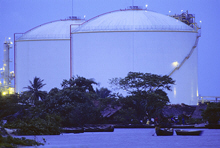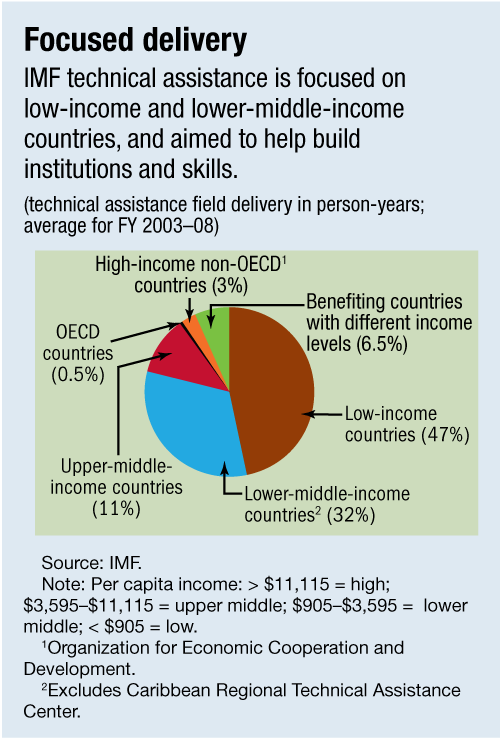
Typical street scene in Santa Ana, El Salvador. (Photo: iStock)
IMF Survey: IMF to Enhance Impact of Its Technical Assistance
July 31, 2008
- Better integrating training, assistance with country reform agendas
- Goals include improved capacity building, performance measurement
- IMF to open four new regional assistance centers, propose topical trust funds
To ensure high impact, technical assistance provided by IMF experts and consultants is being better integrated with the IMF's economic monitoring and lending, as well as with country reform agendas.

Natural gas facility at Bonny, Nigeria: IMF technical assistance aims to help countries manage natural resource wealth (photo: George Steinmetz/Corbis)
CAPACITY BUILDING
The IMF is strengthening its technical assistance program by matching capacity building more closely with overall strategic objectives, introducing improved monitoring and performance measurement, and forging stronger partnerships with the donors who provide financing. In addition, the IMF is planning to open four more regional technical assistance centers around the world.
Unique linkages
For IMF Deputy Managing Director Murilo Portugal, the surveillance-lending-technical assistance relationship is a unique feature that brings important benefits: "The IMF is hardly alone as a technical assistance provider. However, what differentiates us from others in this field are the linkages between our technical assistance and other IMF operations."
IMF surveillance and lending operations help the institution to identify and prioritize technical assistance in line both with a country's strategic objectives and with the IMF's policy advice, Portugal states. "When the IMF makes recommendations to countries within its surveillance and lending programs, in a number of cases it backs the implementation of those recommendations with technical assistance."
Coordination with country authorities
The nexus between the various aspects of IMF operations is becoming more evident in the way technical assistance is now planned in the IMF. The institution's five "area" departments, which are responsible for different regions around the world and are the primary link between the institution and member countries, have assumed the lead role for setting technical assistance strategies in coordination with country authorities.
Presented in Regional Strategy Notes, these strategic plans articulate and prioritize the technical assistance needs of countries, and are set in a medium-term framework to ensure appropriate balance between short-term policy needs and medium-term capacity-building requirements.
Longer planning horizons also help the IMF enhance cooperation with other providers of technical assistance, and facilitate fundraising. The IMF works with the World Bank, regional development banks, and other agencies and donors to ensure that assistance does not overlap and reflects the respective expertise of the relevant parties.
Core IMF function
Providing technical assistance is a core activity of the IMF. Measures to constantly improve its planning and delivery are therefore crucial to the IMF's continued ability to help countries build institutions and skills to design and implement macroeconomic policies that promote growth.
In the IMF's FY2008 alone, close to 200 "person-years" (or about 52,000 working days) of assistance was delivered to IMF member countries. Technical assistance is viewed as a significant benefit by many countries, especially by the lower-income members who receive the bulk of such assistance (see chart).

Improving performance measurement
Reforms are also being pursued to enhance the internal governance and performance measurement of technical assistance in the IMF. A strengthened framework is being put in place to systematically track the achievement of objectives and deliverables in technical assistance projects.
These indicators are defined in advance by project managers and results will then be assessed against them, which would allow for a more systematic evaluation and bring valuable fresh insights to the process. Matching results against initial plans helps ensure that when a shortfall in meeting project targets is identified, lessons can at least be derived to improve future activities.
As a corollary, any meaningful assessment of technical assistance results must necessarily involve a weighing of the costs of delivery. Accordingly, costing technical assistance activities is becoming more accurate and transparent. A clear understanding of costs will also enable more efficient allocation of resources, improve accountability, and facilitate raising additional external financing.
Stronger partnerships with donors
Improvements related to costing and performance measurement are of particular interest to donors who finance the IMF's technical assistance. The IMF has long partnered with donors, whose financial help has allowed it to continue meeting increasing country demands for its capacity-building services.
Alfred Kammer, Director of the IMF's Office of Technical Assistance Management, said the IMF's unique expertise, plus the technical quality and international span of its work, have served to attract much donor support for IMF technical assistance. "Donors tell us that they value our technical assistance program both for its benefits to individual countries as well as for its broader role in promoting international growth and stability. We also value these partnerships because our support to member countries becomes more effective by forging a common platform for coordination and collaboration."
New financing sources
The IMF is seeking to leverage the comparative advantages of its technical assistance to expand donor financing to meet the needs of recipient countries. This will not only entail a deepening of existing donor partnerships but also a broadening of the donor base by tapping into new financing sources.
An area where IMF-donor partnerships have proven especially effective is in the pooling of donor funds to support IMF technical assistance. The IMF's six regional assistance centers—in the Pacific; the Caribbean; East, West, and Central Africa; and the Middle East—are prominent examples of such an arrangement.
Each center receives the bulk of its funding from donor countries, international agencies, regional development banks, and sometimes from recipient countries themselves. Financial participation aside, the centers benefit from donor input by way of steering committees.
Comprising representatives from beneficiary countries, donors, and the IMF, these steering committees provide strategic guidance for the centers' work programs, through a process that helps build consensus and shared ownership of technical assistance delivered. The IMF plans to establish four new regional centers—one in Central America, one in Central Asia, and two more in sub-Saharan Africa.
New trust funds
Building on the multi-donor collaboration theme of the regional center model, the IMF is also developing a menu of topical trust funds to pool donor resources for technical assistance in selected areas of IMF expertise. Such trust funds will help highlight the links between the IMF's technical assistance and donors' own overseas development strategies.
Trust funds could be formed for strengthening public financial management; combating money laundering and the financing of terrorism; developing statistics; managing natural resource wealth; assisting with debt sustainability and public debt/asset management; improving financial sector stability and development in low-income countries; and financing technical assistance to fragile states.
Apart from serving as a vehicle to channel donor resources to countries in need, such pooling arrangements would also facilitate coordination between donors of their respective assistance to countries, as contemplated under the Paris Declaration on Aid Effectiveness. Also, while regional centers tend to have a more "hands-on" approach focused on capacity building, topical trust funds would concentrate on specialized technical assistance on specific issues, creating important synergies from the two initiatives.
Comments on this article should be sent to imfsurvey@imf.org


